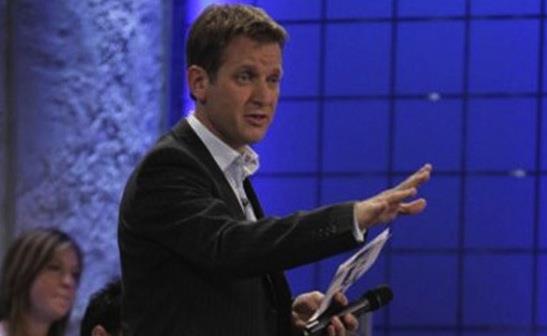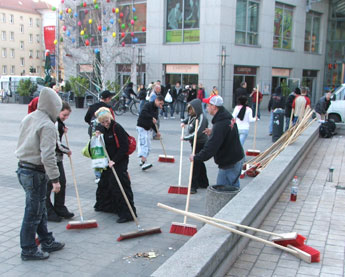 I’ve
talked about Denglisch (and how much it bothers me) before, whereby English
words continue to influence German vocabulary. ‘Downloaden’ is an infamous example,
particularly because Germans are perplexed as to how it would fit in within
their grammar. If you have downloaded something (past tense), would it be
‘downgeloadet’ or ‘gedownloadet’? But
there is also a far darker side to Denglisch. This is where Germans use a
seemingly English word in their lexis with a meaning that doesn’t correspond to
English at all. Such words are known as pseudo-anglicisms.
I’ve
talked about Denglisch (and how much it bothers me) before, whereby English
words continue to influence German vocabulary. ‘Downloaden’ is an infamous example,
particularly because Germans are perplexed as to how it would fit in within
their grammar. If you have downloaded something (past tense), would it be
‘downgeloadet’ or ‘gedownloadet’? But
there is also a far darker side to Denglisch. This is where Germans use a
seemingly English word in their lexis with a meaning that doesn’t correspond to
English at all. Such words are known as pseudo-anglicisms.
"Language changes. Get over it," you might say. English has a rich
variety of sources, so would it be hypocritical to discourage foreign
influences on other languages? No, it wouldn’t. We are far more ‘linguistically
aware’ than ever. Many are proud of their language and wish to protect it,
particularly given English’s role in globalisation. But why should native
speakers of the English language also not protect their language from misuse?
It may not be threatened by other languages, but it is a proud language that
does not want to be taken as a joke.
Translators will be more than familiar with German’s preference for
English terms over its own, but will have no doubt seen English-looking terms
for which they have even had to consult a dictionary. Here are some of the
worst perpetrators:
Wellness
 |
Wellness is synonymous with a
massage and some candles |
Although it is in the English dictionary, most native English speakers
would probably be unable to define this word. Is it a new buzzword meaning
health or well-being, or is it part of the ideology of some New Age cult?
Germans will associate this word with being pampered at a
Wellness-Hotel, perhaps in the secluded mountains of Austria where one can enjoy
the utmost tranquillity and relaxation. In English, we could probably just call
this a spa.
 |
As the phrase is used so often in
German, this key exists on the
German keyboard to save time |
Know-how
I don’t know any into-English translator who doesn’t weep slightly on
the dozens of occasions each day when they see this in a German text. Referring
to technical skills, this term became popular with the rise of the computer,
but fell out of favour with English speakers when it became cliché management
speak.
Despite the fact that KnowHow is the popular face of the support service
offered by electronics stores Currys and PC World in the UK, using this term in
most other contexts in English is linguistic suicide. Conversely, the phrase is
enjoying booming popularity in German. However, I usually translate it as
knowledge and/or expertise.
Beamer
 |
| A Beamer beams just like a beamer |
A Beamer in English means a BMW. A beamer in German means video
projector. I’m stumped as to how this crept into German. We can see
that the word ‘beam’ might have something to do with it, so perhaps the image of a BMW's headlight projecting into the darkness provided some kind of metaphor, but as far as I know, we
have never used the word beamer in this way in English. Granted, beamer is quicker and
easier to say than ‘Videoprojektor’, but we can’t say that Germans aren’t used
to long words.
 |
Jeremy Kyle - the Talkmaster.
Known as such since he never
lets his guests speak |
Talkmaster
A term unheard of in English. One might hazard a guess that it might be
synonymous with chatterbox, but alas, it means a chat show host. Talkshow is
the ‘German’ word for a chat show, so when coining this term, did they not
think it would be a bit silly to just apply the word ‘Meister’ on the end?
Evidently not.
 |
Street working can have various
interpretations |
Streetworker
No other pseudo-anglicism gives rise to such a significant potential
misunderstanding between a German and English speaker than this word. The meaning
of streetworker is more innocent in German, referring to a social worker rather
than a lady who was the object of the 1978 single Roxanne by The Police.
Conclusion: these examples present a very good case for language
regulation. Languages continue to draw inspiration from others and evolve; this
has always been and shall continue to be the case. Nevertheless, since we are
more linguistically aware these days, we should make intelligent decisions to
protect the heritage of our languages.
This is not a denouncement against language enrichment, which is a
completely different subject; rather it is a call to do away with needless
jargon that serves no purpose when alternate terms already exist in or can be
constructed using elements from the target language. Otherwise, it demonstrates
a lack of respect not just for the adopting language (German), but the adopted
language (English). As English becomes the world’s lingua franca, some of those
who speak it as such forget that it is a proud native language for others, who
do not want to see it subjected to ridicule.







